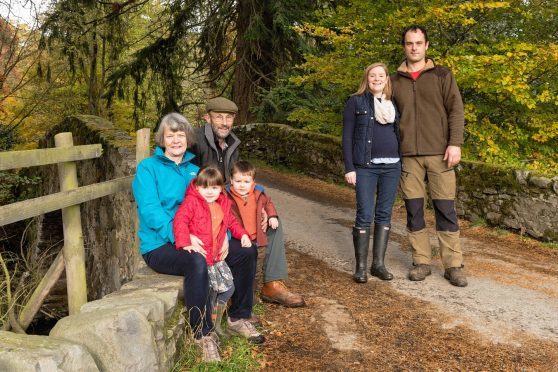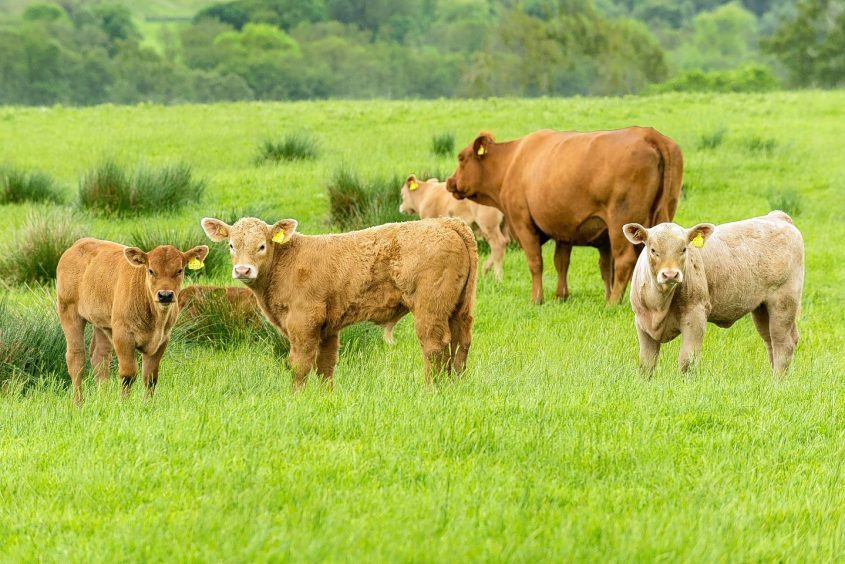An Inverness-shire farmer, whose farm was a finalist in the Scotch Beef Farm of the Year Award, has successfully reduced costs and increased outputs through the use of Stabiliser cattle and sound management practices. Press and Journal Farming finds out more
David Girvan said he was surprised and delighted to have been nominated for the Scotch Beef Farm of the Year Award, which is run by AgriScot and Quality Meat Scotland (QMS).
He farms just over 10,000 acres at Corrimony, Glenurquhart, in partnership with his dad, Lindsay and mum, Mamie. The majority of the farm is fairly unproductive hill rising to 2,200 feet so Mr Girvan has to make the most of his 500 or so acres of in-by grass and forage crops to feed his stock of 130 suckler cows and 1,300 Lleyn, Wiltshire Horn cross and Highlander cross breeding ewes.
Since becoming a member of a local QMS grazing group, Mr Girvan has been experimenting with rotational grazing to try to increase the live weight produced per hectare while keeping costs down.
“This year we rotationally grazed the youngstock, and although we are still getting the hang of it, I can see the potential to improve production. We also used cattle to control the grass and stop it getting away from ewes and lambs on their rotation,” said Mr Girvan.
The family started using Stablisers in 2008 and have been very impressed. Now nearly all the herd is Stabiliser cross, with the first home-bred pure Stabiliser heifer born this year.
“The cows are very quiet and easy to handle. I am looking for a maximum mature cow weight of around 700kg and they are not too big. The calves have impressive growth rates to rival the Charolais and are easily finished,” said Mr Girvan.
The cows are all out wintered on the hill on pot ale syrup and straw and calved outside on grass while the heifers come in to straw courts for the winter and are turned back out once calved.
The bulling heifers are synchronised and artificially inseminated to a Stabiliser bull. Mr Girvan has also put 16 Stabiliser embryos into cows this year using 10 American and six British genetics and he is keen to start selling breeding bulls through the Stabiliser Cattle Company in the near future.
A recent trip to America to view Stabilisers served only to convince Mr Girvan that he is on the right track with the breed and he plans to continue with AI and embryo programmes in order to access the best genetics.
His three Stabiliser bulls and one Charolais are out with the cows for a maximum of nine weeks, and six for heifers, with 70% calved in the first three weeks.
He said: “I aim to get the most out of the cows without being too good to them – for the last three years I have weaned an average of 89% of calves to cows and heifers put to the bull.”
Mr Girvan keeps a keen eye on costs and all the calves are electronically identified to improve accuracy in weighing and sorting for sale. His figures show that in 2014 the total cost of liveweight produced for cattle was £1.66 per kg which reduced to £1.52 per kg in 2015.
The male calves are kept entire and sold at around 14 months and 355kg carcase weight to Woodhead Brothers, who Mr Girvan said are very happy with the bulls supplied through the Stabiliser Cattle Company and are keen to continue.
He has developed a market locally for surplus Stabiliser heifers and said: “They suit this area as they are easy to keep, put on a lot of condition in the summer which sees them through a winter on the hill and seldom need assistance calving.”
The herd has been closed at Corrimony for as long as Mr Girvan can remember which has led to BVD-free accreditation and the family is now in the process of obtaining IBR-free accreditation. The health plan is discussed with the local vet and Mr Girvan said: “I feel the health and welfare of our cows must be good to achieve a high percentage back in calf off grass without the need for extra feeding.”
A relatively low maintenance cattle herd is also important to Mr Girvan for personal reasons. He and wife Barbara have two young children, Lucy (3) and Angus (2) with another on the way.
He said: “We breed and manage the cattle at Corrimony to fit in with our other farm enterprises but I enjoy spending time with my family, so farming must not take up all of my time.”
Lastly, Mr Girvan said he was confident that cattle could remain a profitable part of the farming enterprise at Corrimony in the future and believes that every beef farmer in Scotland has a duty to work at ensuring their produce is up there with the best in the world and deserving of the Scotch Beef PGI brand.

